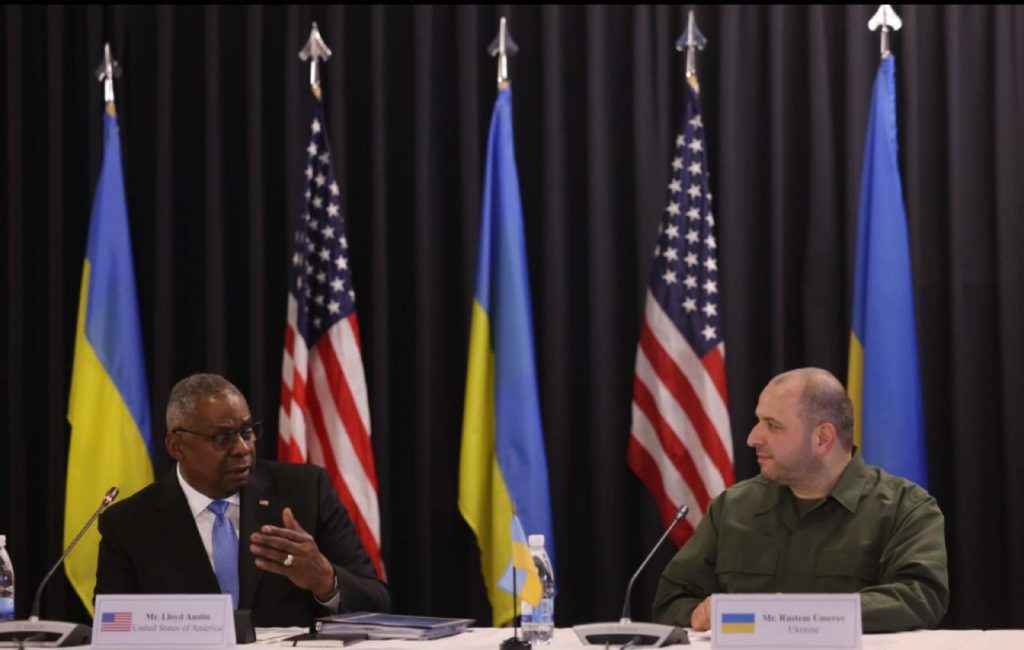The 20th meeting of the Ukraine Defense Support Group (Ramstein format) is taking place in Germany on March 19. The top agenda remains unchanged — providing military assistance to Ukraine in countering Russia’s large-scale aggression and synchronizing allied action. The international coalition is focusing on Ukraine’s immediate battlefield needs and long-term security.
The meeting is being chaired by Pentagon chief Lloyd Austin. Alongside Austin, the head of the U.S. Joint Chiefs of Staff, General Charles Quinton Brown Jr., is also taking part. In total, defense chiefs and senior military officials from about 50 countries were invited.
Russia may lose the initiative on the battlefield in the next two to three months in case the inflow of military and technical support to Ukraine continues unhindered. The Russian offensive in Ukraine has bogged down significantly as they lost the initiative after the capture of Avdiivka and settlements around the town. The Avdiivka campaign cost Russia huge losses (50,000 to 100,000 KIAs and WIAs). Therefore, ensuring Ukraine’s technical edge at this particular moment will not only allow Ukraine to deter further Russian attacks, but also to switch to the offensive over time.
Ramstein meetings are designed to enable Ukraine not only to defend itself, but also to attack Russian military sites and industrial infrastructure, which will limit Russia’s ability to sustain the war. The Russian Aerospace Forces and Navy are suffering significant losses. The number of Russian warplanes shot down and ships sunk has been growing steadily. Moscow has already lost control over the western sector of the Black Sea, where their fleet turned out to be critically vulnerable. Since the full-scale invasion, Russia has lost 15 warships and cutters, and another 12 vessels have been significantly damaged. Also, Russia lost 347 warplanes, 325 helicopters, and 8,328 UAVs.
Russia’s vast territory is much more difficult to cover with air defense systems against Ukrainian drone strikes so the number of such attacks on the aggressor’s military-industrial complex and oil refining facilities, including in temporarily occupied areas, is growing. And that’s including due to the assistance Ukraine has received from Western partners.
On the eve of Ramstein 20, Lloyd Austin said the coalition would focus on Ukraine’s immediate battlefield needs and long-term security.
The United States will not allow Ukraine to lose the war, said Pentagon spokeswoman Sabrina Singh.
On the eve of Ramstein, Belgium announced a package of military assistance for Ukraine worth EUR 412 million that will include 300 LMV armored vehicles.
At the same time, Belgium will provide basic training, and the Netherlands — on-the-job training for Ukrainian minesweeper crews. Belgium also promised to donate to Ukraine some EUR 611 million euros over the course of 2024.
EU top diplomats have decided to allocate an additional EUR 5 billion for military support to Ukraine within the framework of the European Peace Facility. Here’s only part of the assistance that European allies provide to Ukraine to repel Russia’s onslaught:
Bulgaria completed the shipment of all Ukraine-bound armored personnel carriers vowed back in 2023.
Sweden joined the Czech initiative to supply Ukraine with artillery rounds purchased beyond the EU.
Denmark announced the 16th package of military aid to Ukraine worth $336.6 million, which included CAESAR howitzers, self-propelled 120-mm mortars, and ammunition.
The Czech Republic received preliminary consent to purchase an additional 200,000 artillery shells for the Ukrainian Armed Forces, and also announced delivery in June 2024 of the rounds already purchased.
This week, Poland also joined Czechia’s initiative to purchase artillery ammunition for Ukraine across the world.
Three French companies plan to establish partnerships with Ukrainian manufacturers of UAVs and equipment for ground forces with the aim of set up production of spare parts in Ukraine. The project also aim to have Ukraine domestically produce ammunition. France became the first country where both houses of parliament supported the agreement on security guarantees for Ukraine.
Kyiv’s allies from the Ramstein coalition, striving to end the bloody war in the heart of the European continent, should place their main hopes on the exemplary performance by the Ukrainian Armed Forces. Therefore, the best recipe for ending the war, restoring Ukraine’s sovereignty and territorial integrity, and weakening the Russian dictatorship is to provide comprehensive and timely military assistance to Ukraine.

